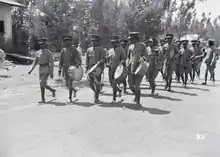Ethiopian National Defence Force Band
The Ethiopian National Defence Force Band (ENDFB) (Amharic: የኢትዮጵያ ብሔራዊ መከላከያ ባንድ, romanized: ye'ītiyop'iya biḥērawī mekelakeya banidi) is a military band of the Ethiopian National Defense Force. It is located in the Ethiopian capital of Addis Ababa for ceremonial use by the state.[2] It is composed of a marching band, a big band, a Corps of Drums, and a youth division.[3]
| Ethiopian National Defence Force Band | |
|---|---|
.jpg.webp) Members of the band during the African Land Forces Summit in Addis Ababa in 2020. | |
| Active | 1941–present |
| Country | |
| Branch | Ethiopian National Defence Force |
| Type | Military band |
| Garrison/HQ | Addis Ababa |
| Commanders | |
| Notable commanders | Colonel Lemma Demissew[1] |
History
Ground Forces Band
The first permanent military band in the country took the form of the Imperial Bodyguard Band (Kibur Zebegna) of the Ethiopian Empire, being formed in 1929 under Swiss conductor Andre Nicod. It originally consisted of just over a dozen chosen slaves from Welega.[4] It was the first African nation to implement western style military music conventions.[5] In 1943, the Ground Force Music Department was founded upon the order of the Minister for War, Ras Abebe Aregai, after Emperor Haile Selassie return from exile in England two years prior.[6] It initially consisted of 65 members, with Alemu Wolde Selassie and Agop Nalbandian (An ethnic Armenian, who was the brother of Arba Lijoch Fanfare bandleader Kevork Nalbandian[7]) serving as instructors.[6] It consisted of four sub-units:

- Marching Band
- Orchestra and Theatre
- Symphony Music
- Music Training
Like the Imperial Bodyguard Band, the band has trained musicians of the Ethiopian Police Band, as well as the Bands of the 2nd and 3rd Army Divisions in Asmara and Harar respectively.[7]
Modern era
It came under the direct command of the Derg in the 70s and went into its current form in 1991.[8] It received assistance from the British Royal Corps of Army Music, most recently between 2007-2012.[9][10]
Duties
Since its inception, the Ground Force Band, and now the ENDF Band, has been brought out to perform music on various events, such as state visits, official holidays, and state funerals. The band has itself trained the Tigray and Somali marching bands.[11]
Sources
- https://www.discogs.com/artist/931003-Lemma-Demissew
- "Area Handbook for Ethiopia". 1964.
- Russonello, Giovanni (20 February 2018). "At 10, he moved with his mother to Addis, and a few years later, he joined the Ethiopian Army band's youth division". The New York Times. Retrieved 2018-07-18.
- Briggs, Philip; Blatt, Brian (2009). Ethiopia. ISBN 9781841622842.
- Kidane, Birhane (1993). The Origin and Development of the Imperial Guard Band (1924-1974). B.A. Thesis, Department of History, Addis Ababa University.
- Mekonnen, Timkehet Teffera. "Timkehet teffera (2020). Ethiopian Ground Force Band and Prominent Musicians የኢትዮጵያ ምድር ጦር የሙዚቃ ቡድን እና ሙዚቀኞቻችን".
{{cite journal}}: Cite journal requires|journal=(help) - Mekonnen, Timkehet Teffera. "Timkehet Teffera (2018). Ethiopian Popular Music History Chapter I: Part II".
- Tiruneh, Andargachew; Ṭerunah, ʼandārgāčaw (8 April 1993). The Ethiopian Revolution 1974-1987: A Transformation from an Aristocratic to a Totalitarian Autocracy. ISBN 9780521430821.
- "Army music making in Ethiopia". 11 April 2014. Retrieved 2018-07-18.
- "Short term training for Ethiopian National Defence Force band". 9 April 2013. Retrieved 2018-07-18.
- https://ethiopianbusinessreview.net/archives/5450